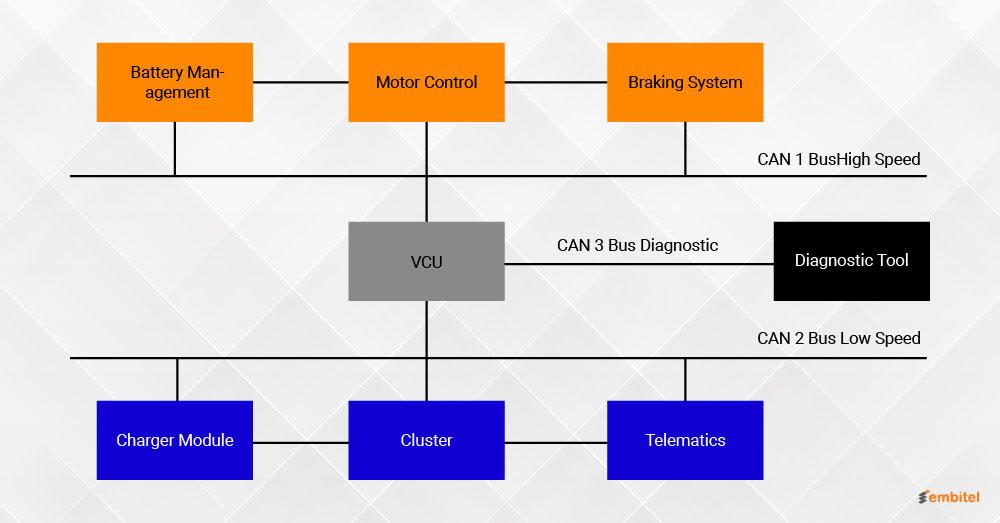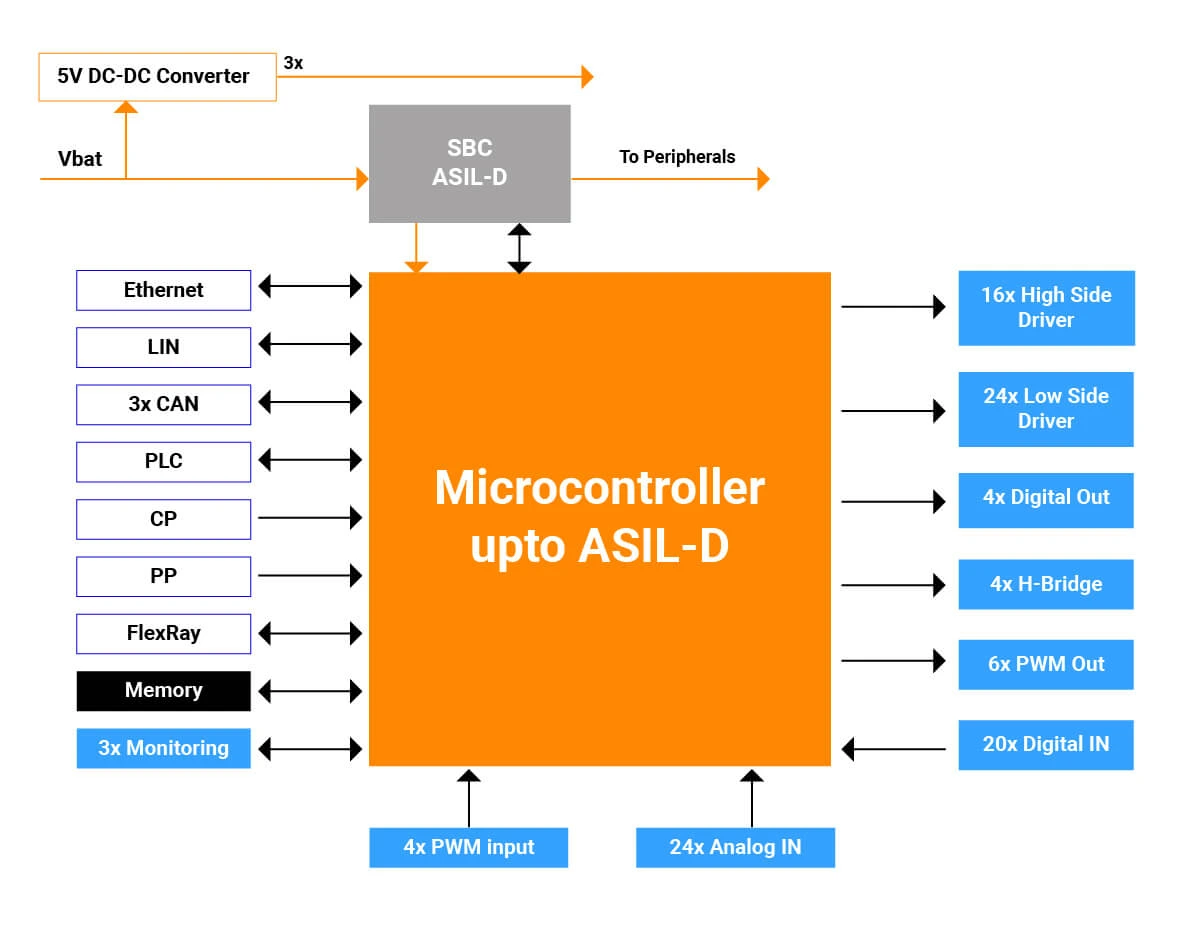Vehicle Control Unit (VCU) Accelerator Solution for Electric Vehicles
The landscape of electric vehicles (EVs) is rapidly evolving, and at Embitel Technologies, we are at the forefront of this transformation. Our Vehicle Control Unit services are designed to deliver unparalleled performance, safety, and innovation to electric mobility solutions.
The Vehicle Control Unit (VCU) is the brain of an electric vehicle, orchestrating the complex interplay between various vehicle systems to ensure optimal performance, efficiency, and safety. Our team of EV engineers have developed a Vehicle Control Unit Accelerator solution that meets the unique requirements of electric vehicle manufacturers.

What Makes Our VCU Accelerator Unique?
80%
Pre-Built VCU Accelerator
With 80% of the platform ready for deployment, our VCU Accelerator slashes development time for faster time-to-market.
ASIL-C Compliant
Certified Safety
Our ASIL-C compliant solution integrates seamlessly with NXPK3 microcontrollers, ensuring reliable, safety-focused performance.
40%
Reduced Time-to-Market
Achieve up to 40% faster deployment, giving you a significant edge in introducing cutting-edge EV technology.
Real-Time
Error Handling & Recovery
Pre-integrated APIs ensure real-time network recovery, minimizing latency and enhancing performance under all conditions.
Advanced Safety
NXP Safety Library & Embitel IP
Our solution meets rigorous ASIL-C/D standards, offering robust safety features with NXP Safety Library and Embitel IP integration.
Our Vehicle Control Unit Accelerator - Benefits
| VCU Unique Traits | Our Solution (MW and Application) |
|---|---|
| Reusing the SW common platform (standardization and Abstraction) | Our Platform API abstraction is not only used by VCU Application, but it can be extended for other vehicle applications such as MCU, BMS and Telematics by utilizing the Common Reusable Platform Components such as UDS Stack, CAN Stack, XCP Stack, CAN Gateway, OTA Components etc. |
| Scalability | The Platform API provides OS and Hardware independent API which allows Application to be developed independently by following model-based design and interface with common signal dictionary interface. New application features can be added in future without disrupting the platform modules. |
| Modular Architecture | The architecture is modularized by having independent services designed with plug and play functionalities. New services or application components can be added based on requirements. Architecture is based on AUTOSAR or Pseudo Architecture based on customer requirement. |
| Configurability | The architecture utilizes configurability to enable/disable specific vehicle parameters and specific features. |
| Safety | Functional Safety Requirements are captured based on HARA analysis. HW and SW design and implementation based on Safety requirements. |
| Security | Multiple levels of cybersecurity libraries are implemented which takes care of security with external communication, internal communication, secure boot and secure update process. |
Key Features of Our VCU Accelerator Solution

Advanced Functional Safety
Our VCU accelerator is designed to meet the highest functional safety standards, ensuring compliance with ASIL C/D requirements.

Flexible Hardware Design
Our hardware platform and components are customisable to support the diverse needs of electric vehicle platforms, including support for complex IO and sensor systems.

Robust Security
Security is paramount in today's connected world. Our Vehicle Control Unit Accelerator incorporates secure boot systems and advanced automotive cybersecurity modules to protect against cyber threats.

Fast Response
With optimized software and hardware configurations, our VCU solution for electric vehicles delivers fast response times, ensuring seamless coordination between various ECUs.
Ready-to-Deploy Vehicle Control Unit Platform - Customisation on Demand
Our VCU Accelerator solution is designed to give you a head start. The platform is highly adaptable, allowing us to integrate the remaining 20% of features based on your specific needs, whether it be powertrain coordination, advanced diagnostics, or security protocols.
By leveraging this pre-developed platform, we eliminate the need to start from scratch, ensuring quicker project kickoffs and faster development cycles.
This approach drastically reduces development costs and timelines while ensuring that you receive a tailored solution that is optimised for your vehicle’s performance and safety requirements.
VCU GEN 3.0: Specifications
| Parameter | Specifications |
|---|---|
| Type | VCU, Gen3.0 Platform |
| Vehicle | 2W ,3W, PV & CV |
| Operating Voltage | 6 – 36V DC, 12V /24V |
| Operating Temperature | -40⁰C to 125⁰C |
| Microcontroller | NXP S32K3x series, TI TMS570x ,upto ASIL-D |
| SBC | NXP FS26 |
| Compliance | ISO 16750, ISO 10605, IEC/EN 60529, CISPR25, ISO 11452, and ISO 7637-2/3 HomePlug Green PHY™ for PLC EVCC Integrated - IEC 61851, DIN 70121, ISO 15118-2 |
| Communication | CAN, ISO-CAN, LIN, Ethernet , FlexRay CP, PP, PLC |
| Third Party Enclosure for POC | IP67 rating with waterproof PA66 respirator |

Our Approach

Hardware Design
Our experienced engineers meticulously design VCU hardware, selecting components that meet stringent safety and performance requirements.

Temperature Monitoring
Each cell’s temperature is monitored in order to maintain excellent performance and efficiency while protecting the battery pack from overheating.
Software Development
We employ a layered software architecture, with a focus on driver development, middleware integration, and application layer design.


Model-Based Design
Leveraging MATLAB/Simulink, we develop VCU application modules that are simulated and validated before hardware implementation, ensuring robust performance and reliability.

Functional Safety and Security
Our solutions adhere to industry standards for functional safety (FUSA) and incorporate secure bootloader systems to safeguard against unauthorized access.
Why Choose Embitel for Your Vehicle Control Unit Needs?
Expertise
With years of experience in automotive electronics and embedded systems, we bring unmatched expertise to every project.
Innovation
We stay ahead of the curve with continuous research and development, delivering innovative solutions that drive the future of electric mobility.
Collaboration
We partner closely with our clients, understanding their unique requirements and delivering tailor-made solutions that exceed expectations.
Quality Assurance
Our rigorous quality assurance processes ensure that every VCU we deliver meets the highest standards of performance, reliability, and safety.

FAQs
The Vehicle Control Unit (VCU) is a pivotal Electronic Control Unit (ECU) within the EV Electronics Systems. Serving as the central nervous system of an Electric Vehicle, the VCU manages and coordinates various subsystems of the EV Vehicle System.
The Vehicle Control Unit interfaces with other ECUs such as Battery Management , Motor Control Unit , Braking System, Charger System, Instrument Cluster Display, and Telematics. It’s interconnected via multiple CAN bus networks, acting as a Gateway module to facilitate signal transfer between ECUs.
Centralized Architecture: In this setup, a single central ECU oversees most vehicle functions. VCU functions are integrated with the MCU and BMS.
Decentralized Architecture: Multiple ECUs manage different functions, with each ECU interfacing with the Vehicle Control Unit for coordination.
Domain Architecture: Also known as distributed architecture, it groups ECUs into functional domains. Here, the VCU acts as a domain controller, coordinating operations among individual ECUs within the domain.
The Vehicle Control Unit performs various crucial functions, including:
- Wakeup Control
- Authentication
- Display Indication
- Vehicle State Management
- Riding Modes Coordination
- Powertrain Coordination
- Brake Management
- Thermal Management
- Charging Control
The VCU handles the wakeup of ECUs such as MCU and BMS based on vehicle unlock and wakeup conditions, ensuring efficient power management.
In Powertrain Coordination, the Vehicle Control Unit provides torque coordination, throttle coordination, operation, and gearshift strategies for the Motor Control Unit (MCU), ensuring optimal performance and efficiency.
The VCU monitors the Brake system and coordinates operations between the MCU and Brake system. Additionally, it manages parameters and control for Regenerative Braking , enhancing energy efficiency.
The Vehicle Control Unit coordinates signals over the CAN bus to assist in various riding modes, including Hill Hold Control, Adaptive Riding Position, and Traction Control, enhancing both safety and comfort during the ride.


